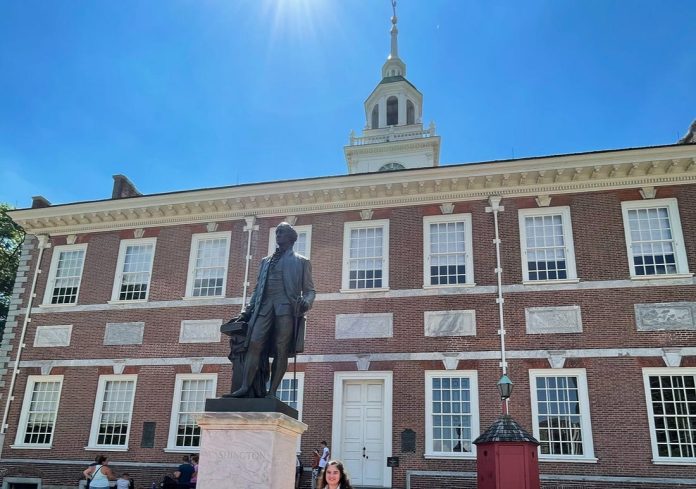Feature
By Catherine Salgado, 7-2-25
Founder John Adams rejoiced that the July 1776 “Day of Deliverance” would be commemorated “by solemn Acts of Devotion to God Almighty”, parades, “illuminations,” and shows. But he wasn’t talking about July 4.
There are so many inspiring, beautiful stories about the great heroes of American history which are scarcely ever told. One happens on them accidentally—buried in a thick, out-of-print biography, in small print on a museum sign, casually and fleetingly mentioned in an obscure educational video. America cannot return to greatness in the future if we do not truly understand the greatness of our past. That is why I am writing an article series to tell a few of these little-known but moving or illustrative “untold stories” of American greatness. Other stories in this series include the “indomitable courage” of D-Day heroes; “The Jazz Singer,” Al Jolson, and the first “talkie” movie; Bing Crosby’s WWII letters to troops and families; Alexander Hamilton storming Redoubt 10 at Yorktown; and Elijah Anderson, martyr of the Underground Railroad. Today’s story is about the day that John Adams believed should have been our national Independence Day.
The Continental Congress in Philadelphia was divided, split into hostile factions, that summer of 1776. There were those who opposed independence altogether, like John Dickinson of Pennsylvania and John Rutledge of South Carolina; those who were strongly in favor of it, like John Adams of Massachusetts, Caesar Rodney of Delaware, and Ben Franklin of Pennsylvania; and those who were persuadable one way or another, like James Wilson of Pennsylvania (as you can tell, Pennsylvania’s delegation had problems). Adams in particular was chafing at the division and delay.
After all, American troops had been in the field fighting under George Washington for more than a year, and Great Britain had shown that it would not heed the Americans’ pleas whether enforced with documents or bullets, and Adams couldn’t understand why Congress wouldn’t vote for independence. To him, the choice was so obvious. But not all his fellow delegates agreed with that view, and some were furious with him for proposing it.
Finally, in July, Adams had his chance. Richard Henry Lee of Virginia, another avid supporter of independence but with fewer hostile opponents in Congress, introduced the resolution instead of Adams, who seconded it. Adams had managed to attract a lot of personal animosity through his aggressive campaign for independence from those too afraid or too lacking in vision to support it. That is also why Adams did not lead the committee of five drafting the Declaration of Independence, thus avoiding votes against it on the grounds it was “his” Declaration.
Lee’s famous resolution read:
Resolved: That these United Colonies are, and of right ought to be, free and independent States, that they are absolved from all allegiance to the British Crown, and that all political connection between them and the State of Great Britain is, and ought to be, totally dissolved.
For the resolution to pass Congress, not a single state could vote “nay.” The fate of the future Republic hung in the balance as naysayers sneered, slaveowners objected to some proposals, and the two Delaware delegates in Congress were in disagreement about how to vote. Caesar Rodney from Delaware rode through the night, 80 miles in a thunderstorm, to break his delegation’s deadlock and vote for independence.
Related: Untold Stories: Caesar Rodney’s Midnight Ride Brought U.S. Independence
Thus on July 2, the Continental Congress finally voted for independence. John Adams was euphoric, elated. His dream was being realized, and a new nation was being established. Little did Adams know he would one day be the first vice president and second president of the new nation.
Adams wrote to his “dearest friend” and confidante, who also happened to be his wife, Abigail: “The Second Day of July 1776, will be the most memorable Epocha, in the History of America.—I am apt to believe that it will be celebrated, by succeeding Generations, as the great anniversary Festival.”
The triumphant Adams enthused, “It ought to be commemorated, as the Day of Deliverance by solemn Acts of Devotion to God Almighty. It ought to be solemnized with Pomp and Parade, with Shews, Games, Sports, Guns, Bells, Bonfires and Illuminations from one End of this Continent to the other from this Time forward forever more.”
Well, he was right about the celebrations, he was just not right about which day we’d celebrate. Why, in fact, do we celebrate July 4 instead of July 2, a choice that was always a source of irritation to Adams? While the delegates voted on the resolution July 2, the Declaration of Independence, as originally drafted by Thomas Jefferson and the other members of the committee of five (Adams, Ben Franklin, Roger Sherman, and Robert Livingston), is not the one we know so well now. Certain sections and phrases were removed or edited, including, unfortunately, a condemnation of slavery. There were Southern delegates who would have killed independence before it was born otherwise. The final draft, the one read to the people some days after the initial vote, was adopted on July 4, which is why we celebrate that as Independence Day.
We now see Independence Day as pure joy and celebration. But that birth year of our nation, 1776, was a difficult and often dark year for the American troops and Declaration signers alike. Benjamin Rush wrote decades later to fellow signer Adams remembering the extreme gravity of the whole process, “Do you recollect the pensive and awful silence which pervaded the house when we were called up, one after another, to the table of the President of Congress, to subscribe what was believed by many at that time to be our own death warrants?”
The men who signed the Declaration were defying the most powerful empire on earth, they were taking on a superb Navy and massive Army. Some of the signers would die during the ensuing Revolution, and some would lose their property or their family members. They would all have a price to pay. And if the Americans had been defeated, the losses would have been that much greater for all of them. The question each delegate had to ask himself was — could they truly win the Revolution, or would they all hang as traitors?
Now we know the answer. The brave patriots who voted for independence on July 2, 1776, and signed the Declaration made history and founded a new nation, based on the glorious proposition Jefferson so eloquently expressed “that all men are created equal, that they are endowed by their Creator with certain unalienable Rights, that among these are Life, Liberty and the pursuit of happiness.
Source: https://catherinesalgado.substack.com/p/untold-stories-the-first-us-independence
© 2025 Catherine Salgado, Republished with permission of author.
Get a premium subscription to Ms. Salgado’s Substack blog: Pro Deo et Libertate
Catherine Salgado is a contributor for PJ Media. She also writes for Media Research Center, The Prickly Pear, and her Substack Pro Deo et Libertate. She received the Andrew Breitbart MVP award for August 2021 from The Rogue Review for her journalism.









